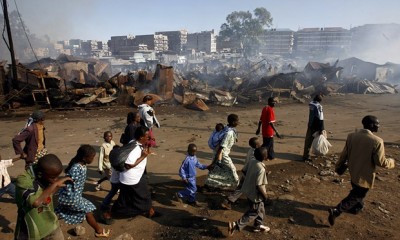
As an orphan, Adhiambo shuttled between the homes of relatives in one of Nairobi’s poorest neighbourhoods during school holidays. One of those trips, in December 2007, ended in violence. She was gang-raped by about 10 men, who singled her out because of her ethnicity.
Adhiambo, who was 17 at the time, is one of 163 people interviewed by Human Rights Watch (HRW) for a report that concludes hundreds of women are still struggling with the devastating physical and psychological effects of the violence which swept Kenya following a disputed election.
The report, I just sit and wait to die: reparations for survivors of Kenya’s 2007-08 post-election sexual violence, documents how women were raped, mostly by gangs of between four and 10 attackers.
Women said they were penetrated with guns, sticks, bottles and other objects. Many were raped in the presence of family members, including children. Some men and boys were also raped or forcibly circumcised or castrated, said the report, published on Monday. The attackers included members of Kenya’s security forces as well as civilians and militia groups.
Thirty-seven women told researchers they became pregnant as a result of the assaults and many did not undergo an abortion, which remains illegal in most cases in Kenya. Several others contracted HIV from the attackers.
“I was raped by five men. They were beating me, pulling my legs apart,” said Njeri, who suffered fistula and still has a leg injury and back pain. “I got so hurt. I have a problem controlling urine. I am so ashamed.”
At a press briefing, HRW demanded that the government do more to help the survivors of sexual violence.
Advertisement
In March 2015, President Uhuru Kenyatta announced a fund of 10 billion shillings (£6.8m) to provide “restorative justice” but this has mainly gone to people who were displaced and not to those who suffered sexual violence.
“We were shocked to find how many survivors are sick, living in poverty and stigmatised, ignored, and often rejected instead of helped by the government,” said Agnes Odhiambo, senior Africa women’s rights researcher at HRW.
The wave of killings broke out after election officials announced President Mwai Kibaki, a member of the Kikuyu community, as the winner of the December election in 2007. The verdict was bitterly contested by supporters of opposition leader Raila Odinga, a member of the Luo community.
Youths allied to the two ethnic groups set upon each other in a campaign of killing and displacement that shocked many Kenyans. The country had long been seen as a bulwark of stability in a turbulent region.
The fighting left 1,133 people dead and displaced approximately 600,000 people. Officials say at least 900 cases of sexual violence occurred, but campaigners say this figure is an underestimate.
Adhiambo told the Guardian she was unaware of any problems when she left the home of her cousin in the Kariobangi neighbourhood of Nairobi to head to the house of another relative in a nearby informal settlement.
“I just saw these Kikuyu young men and I think they immediately realised I am Luo from my physical features. They didn’t say anything. They just beat me up and raped me in turns. They abandoned me near the river until I was rescued by a Kikuyu woman who dressed me but said she had to run because she was fleeing to a part of the slum with more Kikuyus. It was just chaos.”
Advertisement
Adhiambo did not tell relatives about the attack until she fell ill and was taken to hospital, where they found out she was pregnant. She resisted pressure from family and friends to seek an abortion in one of the many illegal clinics that carry out the procedure, but told researchers she is often bitterly conflicted about her child.
“I abused Brooklyn [her daughter] and even attempted suicide. One time I had planned to go to Gikomba [market] and leave her there. I have abused Brooklyn so much that now she is very poor in class and a child who is very afraid. She fears me … when I missed food or something, I used to beat her. I used to tell her, ‘I would be very happy if you died’. I wanted to punish her so that she doesn’t hurt me by asking me for food. I started beating her when she was very young, not even one year.”
Adhiambo is now a member of a group known as Grace Agenda, a collective of survivors of the violence who engage in group therapy. Through the initiative, Adhiambo has learned to accept her child and is now actively engaged in community outreach to survivors of the violence, particularly those who became pregnant after the assaults.
Other women in the HRW report said they had been left abandoned by family. “After the rape my husband refused to sleep in the same bedroom with me,” said Nyawira, a member of the Kikuyu community.
“He used to beat me, telling me to go to my Kalenjin [an ethnic group] husbands. He would ridicule me: ‘You are useless; you better die. I cannot even touch you,’” she said.
Another woman, Achieng, recalled being raped by 10 members of the anti-riot General Service Unit. Mwangi, 83, was sexually molested and his daughters raped.
In 2014, the Nairobi-based Coalition On Violence Against Women was one of the petitioners in a case brought against senior government officials on behalf of six women sexually abused during the post-election violence. The initiative did not succeed, but the international criminal court appointed a special adviser on gender in 2012 to help improve investigations on gender-based violence following protests by human rights campaigners about the low conviction rates.
END

Be the first to comment